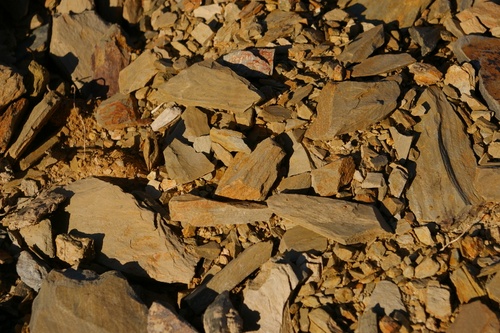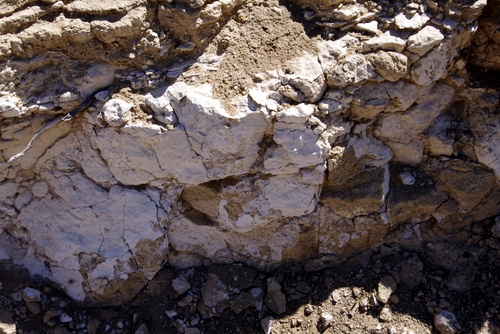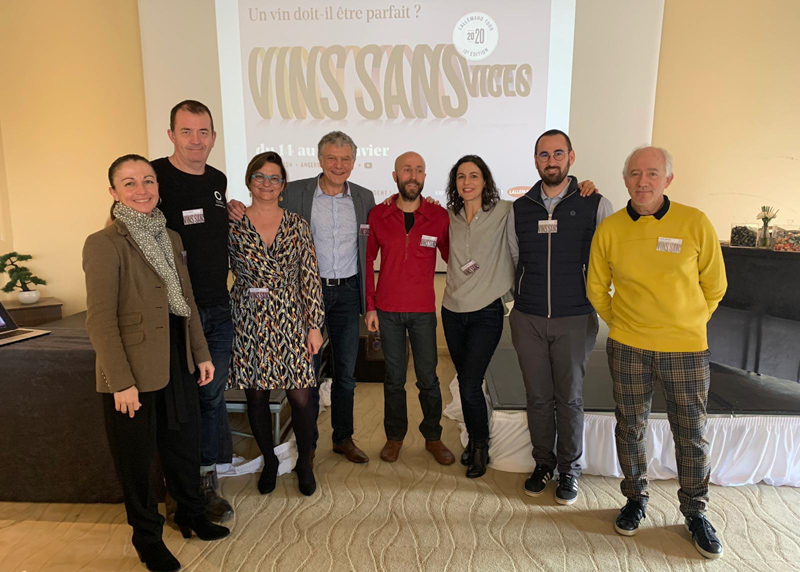
There’s a very interesting article on Jancis Robinson.com today, in which she reports on a recent Institute of Masters of Wine (IMW) seminar on mineralogy. It deals with some very interesting issues. In her piece, she reports on Maltman’s talk, but I think she jumps to too-hasty a conclusion about its implications.
As geologist Alex Maltman explained forcefully, in a reasoned, well-illustrated talk, there can be no direct link between what is below the surface of a vineyard and the flavours found in the resulting wine. This despite the fact that soil type has long been held to be one of the fundaments of the sacred notion of terroir – and today one of most common activities among vine growers the world over is to dig a soil pit in their vineyards to show what type of rocks lurk below.
Just because there is no direct link between the soil and the flavour of wine doesn’t mean that soils don’t influence the flavour of the wine. Soil pits are cool. We shouldn’t feel bad about them.
Despite what Jancis implies here, soil type remains one of the fundaments of terroir. While some definitions of minerality – namely that minerals from the soil end up in the wine and flavour the wine – are now in peril, Maltman’s thesis doesn’t question the notion that soils alter the flavour of the wine, in the way that Jancis implies.
[As an aside, I think we should keep the door open slightly for a direct effect of soil minerals on wine flavour, as I argue here in this piece on the mystery of soils and wines. But that’s a discussion for another time.]
The key here is the word directly. Those of us who taste curiously and widely know how important soil type is. Wines from a particular soil type often share similar characters: the same variety grown on clay, schist, granite, sand or limestone will often taste quite different, even if the climate is identical. And you can often spot the imprint of the soil type on wine style, even across varieties and climates. I don’t think this is controversial.

The soil is having an indirect effect on wine flavour, facilitated through plant physiology and microbial activity. Teasing apart the mechanisms of this is likely to prove super-complicated. Yes, water holding capacity is important, but so is soil chemistry, although that’s disputed by some.
I understand the frustrations around the use of the term ‘mineral’. Attempts to identify the ‘mineral’ component of wine through sensory analysis, lexical analysis and chemical analysis are, I suspect, doomed to failure. We should just stop trying. Let people use the descriptors they like to use. If I say that a wine is silky, I don’t have to prove to a scientist that there’s silk in the wine. So if I say a wine is mineral, why should MWs and scientists demand proof that I’m referring to a chemical that is soil- or rock-derived?
But I feel that in the face of this criticism, Jancis is backing down, giving in all too easily. She should fight her corner. Why should we have to abandon the idea that soils influence wine flavour? They do. It’s just a question of how, and that is likely to be very hard to prove scientifically, even though it’s not a controversial idea to those who taste lots of wines from around the world, and spend time obsessing over soil pits.
So, the death of terroir has been greatly exaggerated.
Coincidentally, I just got this question from a reader today:
I’ve been reading Alex Maltman’s Minerality in Wine: A Geological Perspective, and have just finished your article More on Terroir: A Geologist Speaks. I have a question and if you haven’t time to answer, I totally understand.
In your article, you say that for some vineyards planted on deep, fertile soils, there will not be much of a terroir effect. However, if I’ve understood Maltman’s observations correctly then if said soils had a high CEC then surely those deep, fertile soils could produce grapes with a mineral nutrient rich juice, in which which yeasts and other bacteria could flourish during fermentation to make an interesting wine, regardless of the lack of bedrock influence on the soil?
Or is it the LACK of certain mineral nutrients in less fertile, shallower soils that would produce less nutritionally balanced juice, thus forcing yeasts to metabolise, for e.g., sulphur compounds, that would lead to a wine with potentially more interesting/site specific flavour compounds?
I suppose the simple question is: would the fertile soil produce an overly nutritionally balanced must that would in turn produce a boringly over balanced wine?
I think it’s the latter – it’s the less fertile soils producing a nutritionally less balanced juice, which causes the yeasts to do interesting things during fermentation, such as producing volatile sulfur compounds. Let’s not forget about the importance of microbes, be they local indigenous bugs, or cultured yeasts and bacteria.
The other effect of deep soils is to cause more vigorous growth of the vine, which then concentrates less on fruit production and is less in balance. This can affect the flavour of the wine quite significantly, and usually detrimentally.
4 Comments on Terroir: the rumours of its death have been greatly exaggerated

Surely the main concern with vines on deep, fertile soil is the tendency to overcrop, leading to dilute flavours and/or delayed ripening?
Though that would be expressing the character of that terroir, I guess, whereas lots of intervention to restrict crop load on these soils, leading to smaller crops with more flavour, would be the terroir-effacing move?
Jaime, I read Jancis differently than you do, as she did say that “those of us who taste thousands of wines a year do perceive various shared characters in wines grown on certain soil types.” I’m not sure how that’s “abandon[ing] the idea that soils influence wine flavour,” since it almost completely mirrors your statement that “Wines from a particular soil type often share similar characters.”
She also refers to the experimental tastings which show there’s “sufficient consistency in how tasters rated the degree of minerality in different wines to suggest that it may well actually exist in the wines, rather than being a concept driven by group expectation.”
My take on her article is that Jancis is in complete agreement with you, unless and until you more directly assert a *direct* effect of soil minerals on wine flavor.
Myself, I think that most anyone who has compared a number of Savennieres with a number of Vouvrays – just one possible comparison – would likely agree that differences in soil types are meaningful, and I hope that’s not just wishful thinking.
Amen, Jamie. If someone describes a Gewürztraminer as having hints of rose petals, nobody tries to rubbish it by saying it’s impossible for the roses that might have been planted at the end of the rows of vineyards to somehow infuse their essence into the vines and resulting wine.
If someone smells “wet dog” on a wine, nobody’s thinking that a dog might have been been buried in the vineyard. The same goes for a myriad of other attempts at describing how a wine tastes. Why do descriptions related to minerality get special treatment?
I’m more than okay with it when people maintain that there’s no perceptible direct mineral transmission from soil to vine (and I’m in cautious agreement), but to tell me I can’t smell – let’s say – something akin to gravel on a wine, is just arrogant and pompous. Even though I would say that a variety of minerally aromas and flavours are clearly prevalent in many wines, I won’t be telling anyone that they are “wrong” if they don’t also smell and taste them.
Coming from an ecologists perspective, there are many variables in soil micro-habitats that could also influence outcomes. Mycorrhizae for one, that essentially extends the rooting area of vines by 7x. Soil cultivation tends to interfere with this relationship and is a disturbance to the ecosystem, altering soil structure, soil loss through erosion,and changing microbial populations.I call myself a Vit-ecologist rather than a Viticulturalist! Local yeasts may also add to the complexity. There needs to be more focus on an ecosystems approach to viticulture, rather than organic/biodynamic focus, as the use of copper (a heavy metal) in sprays maybe organic but accumulates in the soil and earthworms do not like it much. The same goes for cultivation. A spray/treatment may solve one problem but create another.